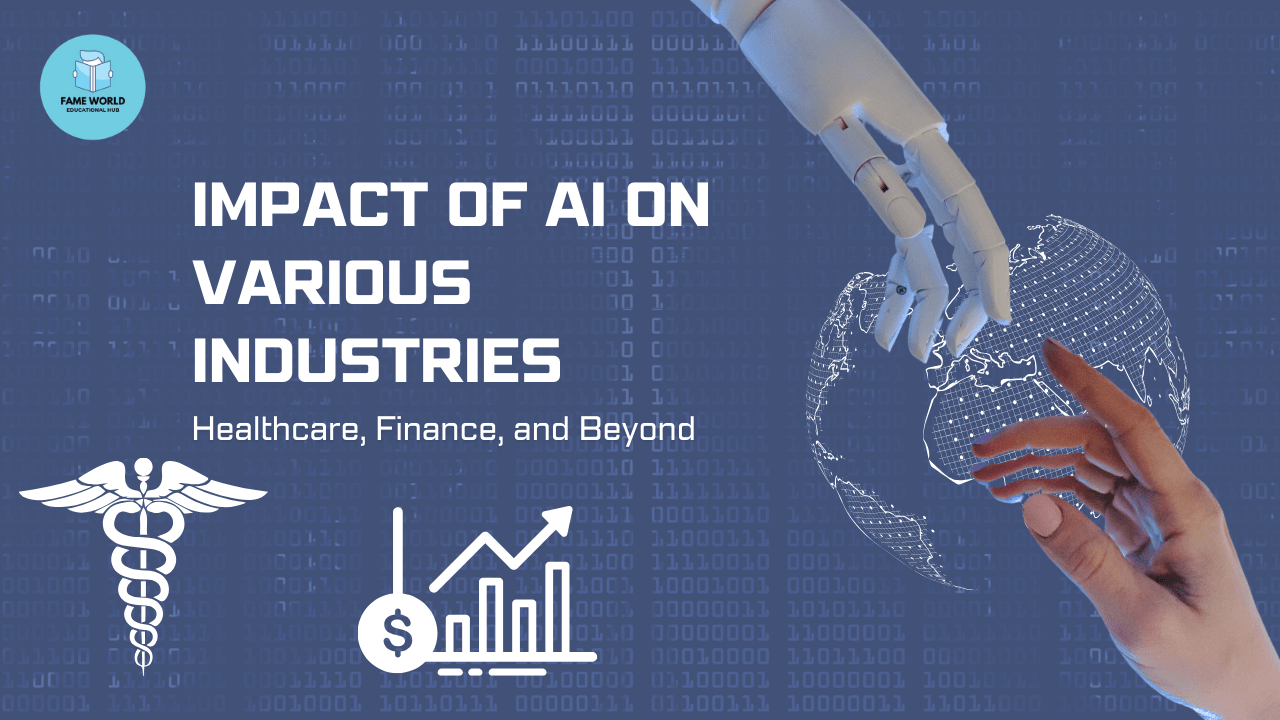Artificial Intelligence (AI) has become a transformative force across numerous sectors, fundamentally altering the way industries operate and innovate. From improving efficiencies to creating entirely new business models, AI’s influence is profound and far-reaching. In this blog post, we will explore how AI is reshaping key industries, focusing on healthcare, finance, and beyond. We’ll delve into specific applications, benefits, challenges, and the future outlook for each sector.
1. Healthcare
1.1 Diagnosis and Treatment
AI’s role in healthcare is particularly notable in diagnostics. Machine learning algorithms can analyze medical images with high accuracy, assisting radiologists in detecting conditions such as cancer, fractures, and neurological disorders. For example, AI-powered tools like Google’s DeepMind have demonstrated exceptional performance in diagnosing diabetic retinopathy from retinal images.
In treatment, AI enables personalized medicine by analyzing genetic data to tailor treatments to individual patients. Algorithms predict how patients will respond to specific therapies, optimizing treatment plans and improving outcomes.
1.2 Drug Discovery
The drug discovery process has traditionally been time-consuming and costly. AI accelerates this process by analyzing vast datasets to identify potential drug candidates, predict their efficacy, and optimize chemical structures. Companies like Atomwise are using AI to discover new drugs and repurpose existing ones, significantly reducing development times and costs.
1.3 Patient Care and Management
AI-driven chatbots and virtual assistants are transforming patient care. They provide 24/7 support for routine queries, appointment scheduling, and medication reminders. AI systems also monitor patient data in real-time, identifying patterns and alerting healthcare providers to potential issues before they become critical.
1.4 Challenges and Considerations
Despite its potential, AI in healthcare faces challenges such as data privacy concerns, the need for robust validation, and the integration of AI systems into existing workflows. Ensuring ethical use and addressing biases in AI algorithms are crucial for maintaining trust and effectiveness.
2. Finance
2.1 Fraud Detection and Prevention
AI is a game-changer in financial fraud detection. Machine learning algorithms analyze transaction patterns to identify anomalies that may indicate fraudulent activities. For instance, banks use AI to monitor real-time transactions and flag suspicious behavior, reducing fraud and enhancing security.
2.2 Algorithmic Trading
Algorithmic trading, driven by AI, executes trades at high speeds and volumes that human traders cannot match. AI algorithms analyze market data, identify trends, and execute trades based on predefined criteria, optimizing trading strategies and improving market efficiency.
2.3 Risk Management
AI improves risk management by analyzing historical data and predicting potential risks. Financial institutions use AI to model various risk scenarios and assess their impact on investments and portfolios. This predictive capability helps in making informed decisions and mitigating financial risks.
2.4 Customer Service
AI chatbots and virtual assistants enhance customer service by providing instant responses to inquiries, processing transactions, and offering financial advice. These AI systems can handle a high volume of requests efficiently, freeing up human agents for more complex tasks.
2.5 Challenges and Considerations
Challenges in AI adoption in finance include regulatory compliance, data security, and the need for transparency in AI decision-making processes. Financial institutions must address these issues to ensure the responsible use of AI technologies.
3. Beyond Healthcare and Finance: Other Industries
3.1 Retail
In retail, AI enhances customer experiences through personalized recommendations and targeted marketing. AI-driven systems analyze consumer behavior and preferences to offer tailored product suggestions, optimize pricing strategies, and manage inventory more effectively.
3.2 Manufacturing
AI improves manufacturing efficiency by enabling predictive maintenance, optimizing supply chains, and automating production processes. AI-powered robots and automation systems enhance precision, reduce downtime, and lower operational costs.
3.3 Transportation and Logistics
AI revolutionizes transportation and logistics with autonomous vehicles, route optimization, and smart traffic management. AI systems analyze traffic patterns, weather conditions, and other factors to optimize delivery routes and improve logistics operations.
3.4 Education
In education, AI personalizes learning experiences by adapting content to individual student needs and providing real-time feedback. AI-powered platforms can analyze student performance data to identify learning gaps and suggest tailored interventions.
3.5 Entertainment
AI influences the entertainment industry through content recommendations, creative processes, and audience analysis. Streaming services use AI to recommend movies and shows based on viewing history, while AI-generated content is pushing the boundaries of creativity in film and music.
3.6 Challenges and Considerations Across Industries
Across various sectors, challenges such as data privacy, ethical considerations, and the need for transparency in AI decision-making persist. Industries must address these challenges to fully realize AI’s potential while ensuring responsible and ethical use.
Conclusion
AI’s impact on industries such as healthcare and finance, and beyond, is profound and transformative. From enhancing diagnostics and personalized medicine in healthcare to revolutionizing fraud detection and trading strategies in finance, AI is reshaping how industries operate and deliver value. As AI continues to evolve, its applications and implications will expand, presenting both opportunities and challenges. Embracing AI’s potential while addressing ethical and practical considerations will be crucial for maximizing its benefits across various sectors.
Feel free to use this blog post as a comprehensive overview of AI’s impact on different industries. If you need more specific examples or deeper insights into any of these areas, just let me know!



